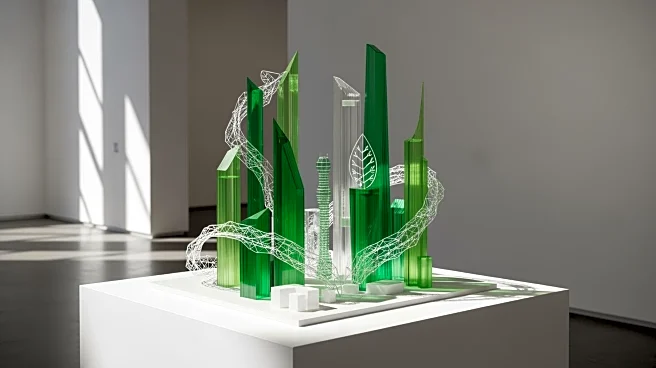What's Happening?
The sixth edition of the Chicago Architecture Biennial, titled 'SHIFT: Architecture in Times of Radical Change,' is currently underway, featuring over 100 projects from around the world. Led by Florencia Rodriguez, the biennial aims to explore how architecture
can contribute to a more sustainable, affordable, and equitable world. The event includes innovative reuse projects, such as transforming a decommissioned wood granary in Wisconsin into a cultural site, and speculative ideas like accessible urban designs for New York City. Despite its focus on sustainability, the biennial faced controversy due to funding from Crown Family Philanthropies, linked to defense company General Dynamics, leading to participant withdrawals.
Why It's Important?
The Chicago Architecture Biennial highlights the critical role of architecture in addressing global challenges such as homelessness, reliance on fossil fuels, and environmental degradation. By showcasing projects that emphasize reuse and sustainability, the biennial encourages architects and urban planners to rethink traditional practices and materials. The event also serves as a platform for discussing housing innovations, which are crucial given the United Nations' report on inadequate housing for nearly 3 billion people worldwide. The biennial's focus on real-world projects and speculative designs offers valuable insights into potential solutions for urban development and environmental sustainability.
What's Next?
The biennial runs through February 28, 2026, at various venues across Chicago, providing opportunities for public engagement through conferences, panels, and lectures. As the event progresses, it may influence future architectural practices and inspire new projects that prioritize sustainability and social equity. The controversy over funding sources may prompt discussions on ethical considerations in project financing, potentially leading to more transparent and responsible funding practices in the architecture industry.
Beyond the Headlines
The biennial's emphasis on reuse and sustainability reflects broader cultural shifts towards environmental consciousness and resource conservation. By integrating innovative designs and materials, the event challenges traditional architectural norms and encourages creative problem-solving. The inclusion of speculative projects also highlights the importance of visionary thinking in addressing complex urban challenges, offering a glimpse into potential future landscapes shaped by sustainable practices.


















